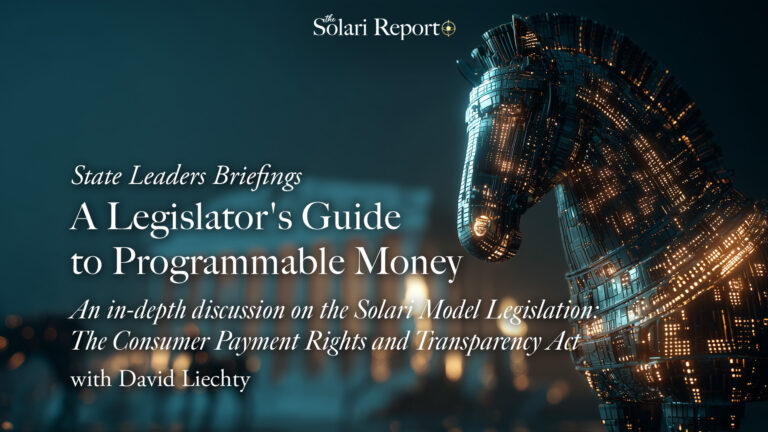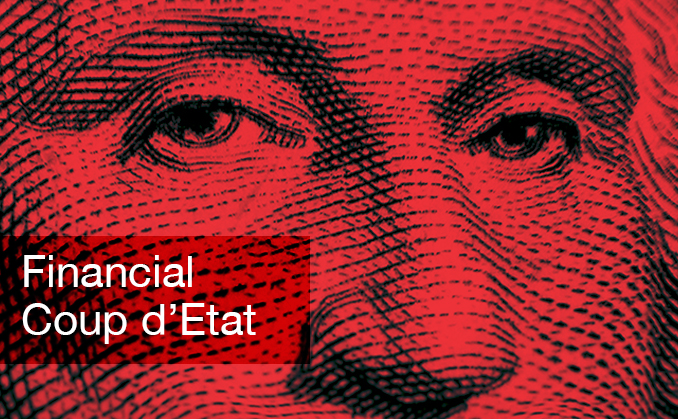In light of recent events, I am republishing.]
By Catherine Austin Fitts
In the fall of 2001 I attended a private investment conference in London to give a paper, The Myth of the Rule of Law or How the Money Works: The Destruction of Hamilton Securities Group.
The presentation documented my experience with a Washington-Wall Street partnership that had:
- Engineered a fraudulent housing and debt bubble;
- Illegally shifted vast amounts of capital out of the U.S.;
- Used “privitization” as a form of piracy – a pretext to move government assets to private investors at below-market prices and then shift private liabilities back to government at no cost to the private liability holder.
Other presenters at the conference included distinguished reporters covering privatization in Eastern Europe and Russia. As the portraits of British ancestors stared down upon us, we listened to story after story of global privatization throughout the 1990s in the Americas, Europe, and Asia.
Slowly, as the pieces fit together, we shared a horrifying epiphany: the banks, corporations and investors acting in each global region were the exact same players. They were a relatively small group that reappeared again and again in Russia, Eastern Europe, and Asia accompanied by the same well-known accounting firms and law firms.
Clearly, there was a global financial coup d’etat underway.
The magnitude of what was happening was overwhelming. In the 1990’s, millions of people in Russia had woken up to find their bank accounts and pension funds simply gone – eradicated by a falling currency or stolen by mobsters who laundered money back into big New York Fed member banks for reinvestment to fuel the debt bubble.
Reports of politicians, government officials, academics, and intelligence agencies facilitating the racketeering and theft were compelling. One lawyer in Russia, living without electricity and growing food to prevent starvation, was quoted as saying, “We are being de-modernized.”
Several years earlier, I listened to three peasant women describe the War on Drugs in their respective countries: Colombia, Peru, and Bolivia. I asked them, “After they sweep you into camps, who gets your land and at what price?” My question opened a magic door. They poured out how the real economics worked on the War on Drugs, including the stealing of land and government contracts to build housing for the people who are displaced.
At one point, suspicious of my understanding of how this game worked, one of the women said, “You say you have never been to our countries, yet you understand exactly how the money works. How is this so?” I replied that I had served as Assistant Secretary of Housing at the US Department of Housing and Urban Development (HUD) in the United States where I oversaw billions of government investment in US communities. Apparently, it worked the same way in their countries as it worked in mine.
I later found out that the government contractor leading the War on Drugs strategy for U.S. aid to Peru, Colombia and Bolivia was the same contractor in charge of knowledge management for HUD enforcement. This Washington-Wall Street game was a global game. The peasant women of Latin America were up against the same financial pirates and business model as the people in South Central Los Angeles, West Philadelphia, Baltimore and the South Bronx.
Later, courageous reporting by several independent investigative reporters confirmed in detail that the privatization and economic warfare model I discussed in London had deep roots in Latin America.
We were experiencing a global “heist”: capital was being sucked out of country after country. The presentation I gave in London revealed a piece of the puzzle that was difficult for the audience to fathom. This was not simply happening in the emerging markets. It was happening in America, too.
I described a meeting that had occurred in April 1997, more than four years before that day in London. I had given a presentation to a distinguished group of U.S. pension fund leaders on the extraordinary opportunity to re-engineer the U.S. federal budget. I presented our estimate that the prior year’s federal investment in the Philadelphia, Pennsylvania area had a negative return on investment.
We presented that it was possible to finance places with private equity and re-engineer the government investment to a positive return and, as a result, generate significant capital gains. Hence, it was possible to use U.S. pension funds to significantly increase retirees’ retirement security by successfully investing in American communities, small business and farms — all in a manner that would reduce debt, improve skills, and create jobs.
The response from the pension fund investors to this analysis was quite positive until the President of the CalPERS pension fund — the largest in the country — said, “You don’t understand. It’s too late. They have given up on the country. They are moving all the money out in the fall [of 1997]. They are moving it to Asia.”
Sure enough, that fall, significant amounts of moneys started leaving the US, including illegally. Over $4 trillion went missing from the US government. No one seemed to notice. Misled into thinking we were in a boom economy by a fraudulent debt bubble engineered with force and intention from the highest levels of the financial system, Americans were engaging in an orgy of consumption that was liquidating the real financial equity we needed urgently to reposition ourselves for the times ahead.
The mood that afternoon in London was quite sober. The question hung in the air, unspoken: once the bubble was over, was the time coming when we, too, would be “de-modernized?”
In 2009 — more than seven years later — this is a question that many of us are asking ourselves.
Part II: Rethinking Diversification
Related Reading:
Dillon, Read & Co. Inc. and the Aristocracy of Stock Profits





















































































































where is george soros now?
It would appear that Mr. Soros is proposing to lead us into the next “fix.”
https://futurefinance.wsj.com/participant.php?bio=35
Soros, the so-called billionaire philanthropist, is probably busy starting another “color revolution”, in the tradition of Jewish financiers who financed Hitler and Lenin.
“He brings down governments via subversion, moral rot and revolution through financial patronage, akin to what Jacob Schiff the New York banker did to Russia through the funding of revolutionary propaganda.1 However Soros’ revolutions are far more widespread than that of Schiff.”
http://www.rense.com/general83/soros.htm
Don’t know where to put this but thought it worthy of mention, Go Kucinich! he wants to nationalize the Fed!! http://www.brasschecktv.com/page/580.html
World Bank scam here:
http://www.brasschecktv.com:80/page/493.html
Soros saying truth about oil price
http://www.youtube.com/watch?v=YrrmBM9jDzw
I’m not sure about posting this….I read it all.but, Its very dishearting. I hope Catherine will read it and tell us if its true. How sad…….. “The Smoking Argus Daily Information Analysis Center” You’ll have to key it in to view it in a PDF file…
Leaked Unclassified Pro-Constitution Report Outlines Tyranny Movement in America
CHICAGO, ILLINOIS, March 27th, 2009: An anonymous internet user leaked to RestoreTheRepublic.net a secretive pro-liberty report documenting the modern tyranny movement in America. The 14-page report published by “The Smoking Argus Daily Information Analysis Center” (SMIAC) lists the growing wave of tyranny stemming from 1913 up to today (March 26,2009), which seeks to threaten the American Constitutional Republic. The report further details specific symbols used by the movement to promote their tyrannical agenda as well as multimedia frequently used by members to ferment wide spread contrived polarization of their electoral base.
About RestoreTheRepublic.com and RestoreTheRepublic.Net – “Restore the Republic!” is the cry from the lips of those Americans who have learned the truth about the land in which we live. It is the movement of those people to action to complete the call. It is real, it is organic, it is grassroots, it is the epicenter. It is the most powerful force for change our republic has ever seen.
For more information or to download and comment on this report please visit:
http://www.restoretherepublic.com/top-stories/leaked-unclassified-pro-constitution-report-outlines-tyranny-movement-in-america